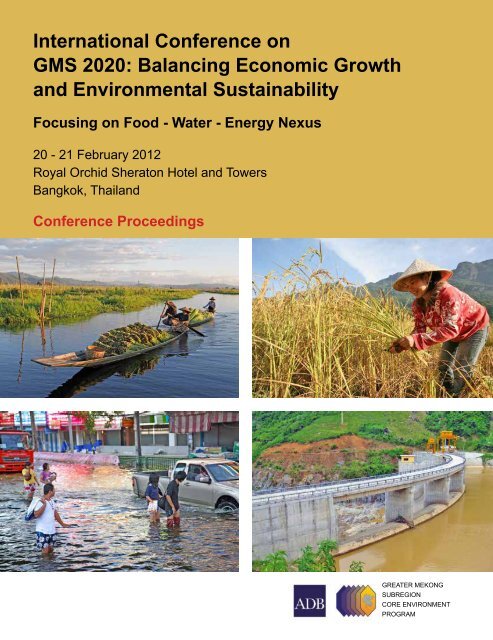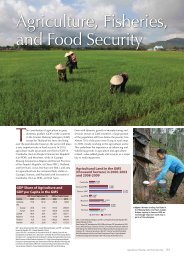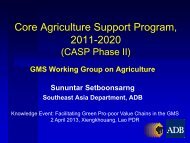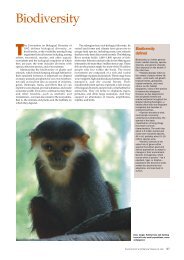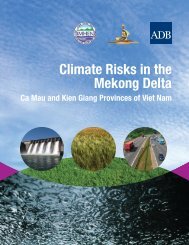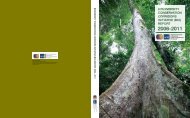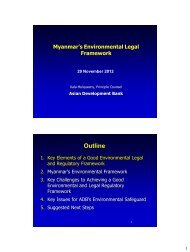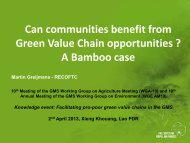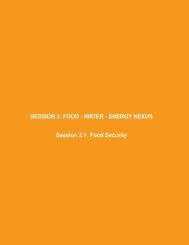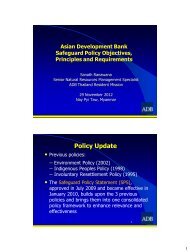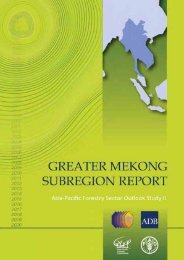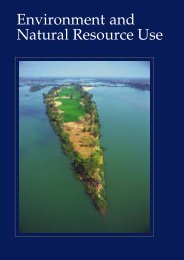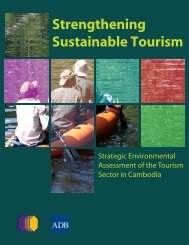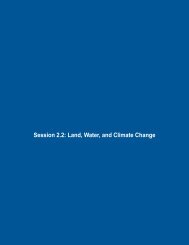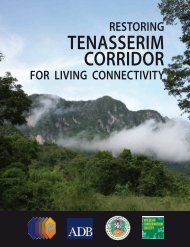Foreword and Conference Inauguration - GMS-EOC
Foreword and Conference Inauguration - GMS-EOC
Foreword and Conference Inauguration - GMS-EOC
You also want an ePaper? Increase the reach of your titles
YUMPU automatically turns print PDFs into web optimized ePapers that Google loves.
International <strong>Conference</strong> on<br />
<strong>GMS</strong> 2020: Balancing Economic Growth<br />
<strong>and</strong> Environmental Sustainability<br />
Focusing on Food - Water - Energy Nexus<br />
20 - 21 February 2012<br />
Royal Orchid Sheraton Hotel <strong>and</strong> Towers<br />
Bangkok, Thail<strong>and</strong><br />
<strong>Conference</strong> Proceedings<br />
GREATER MEKONG<br />
SUBREGION<br />
CORE ENVIRONMENT<br />
PROGRAM
International <strong>Conference</strong> on<br />
<strong>GMS</strong> 2020: Balancing Economic Growth<br />
<strong>and</strong> Environmental Sustainability<br />
Focusing on Food - Water - Energy Nexus<br />
20 - 21 February 2012<br />
Royal Orchid Sheraton Hotel <strong>and</strong> Towers<br />
Bangkok, Thail<strong>and</strong><br />
<strong>Conference</strong> Proceedings<br />
Edited by<br />
Hasan Moinuddin <strong>and</strong> Jay Maclean<br />
GREATER MEKONG<br />
SUBREGION<br />
CORE ENVIRONMENT<br />
PROGRAM<br />
i
ii<br />
International <strong>Conference</strong> on <strong>GMS</strong> 2020:<br />
Balancing Economic Growth <strong>and</strong> Environmental Sustainability,<br />
Focusing on Food-Water-Energy Nexus<br />
20-21 February 2012, Bangkok, Thail<strong>and</strong><br />
ISBN No: 978-616-90685-5-6<br />
Copyright © 2012 Asian Development Bank<br />
All rights reserved<br />
Disclaimer<br />
The analyses <strong>and</strong> assessments contained in this report<br />
are those of the authors <strong>and</strong> do not necessarily reflect<br />
the views <strong>and</strong> policies of the Asian Development Bank<br />
(ADB) or its Board of Governors or the governments they<br />
represent.<br />
The ADB does not guarantee the accuracy of the data<br />
included in this publication <strong>and</strong> accepts no responsibility<br />
for any consequences of their use.<br />
Use of the term “country” does not imply any judgment by<br />
the authors or the ADB as to the legal or other status of<br />
any territorial entity.<br />
Boundaries of all maps contained in this report should not<br />
be considered authoritative. All information contained in<br />
the maps has a high degree of generalization owing to the<br />
small scale of data sets used for map compilation.<br />
Cover Photos: Steven Griffiths <strong>and</strong> Jiao Xi<br />
Printing by Clung Wicha Press Co., Ltd., Thail<strong>and</strong><br />
August 2012 - 2,000<br />
Acknowledgements<br />
The <strong>GMS</strong> Environment Operations Center <strong>and</strong> ADB<br />
would like to thank development partners, governments of<br />
Finl<strong>and</strong> <strong>and</strong> Sweden, <strong>and</strong> the People’s Republic of China’s<br />
Poverty Reduction Fund for their generous contributions<br />
to the Core Environment Program <strong>and</strong> Biodiversity<br />
Conservation Corridors Initiative (ADB TA 6289).
ForEWorD<br />
The Asian Development Bank (ADB) has been assisting the Greater Mekong Subregion (<strong>GMS</strong>) Economic<br />
Cooperation Program since 1992. The program has accomplished a lot because of proactive cooperation of its six<br />
member countries—Cambodia, the People’s Republic of China, the Lao People’s Democratic Republic, Myanmar,<br />
Thail<strong>and</strong>, <strong>and</strong> Viet Nam. The progress is reflected in terms of improvements in infrastructure connectivity, promotion<br />
of trade <strong>and</strong> investment, stimulation of economic growth, <strong>and</strong> reduction of poverty. However, such progress has<br />
not been without some adverse impacts on the environment. Based on such recognition, the countries adopted a<br />
10-year strategic framework in 2002 to address the growing environmental degradation. The framework noted that<br />
“environmental considerations must be at the forefront of all decision-making regarding development projects.”<br />
The <strong>GMS</strong> 2020 International <strong>Conference</strong> – Balancing Economic Growth <strong>and</strong> Environmental Sustainability – provided<br />
the setting to review progress under the 2002-2011 strategic framework, <strong>and</strong> to consider the subregion’s potential<br />
<strong>and</strong> challenges in the coming decade <strong>and</strong> beyond. The conference was highly successful, mainly because of<br />
valuable contributions from nearly 240 participants representing several stakeholder groups including the <strong>GMS</strong><br />
governments, the private sector, development partners, academia, <strong>and</strong> civil society.<br />
The central theme of the conference – food-water-energy nexus, which is already at the forefront of political <strong>and</strong><br />
scientific debate in the <strong>GMS</strong> – attracted most attention from participants. A nexus approach can enhance water,<br />
energy <strong>and</strong> food security by increasing efficiency, reducing trade-offs, <strong>and</strong> building synergies across sectors. Many<br />
presentations, therefore, focused on deepening the awareness <strong>and</strong> underst<strong>and</strong>ing of the nexus as a basis for<br />
transition to climate resilient <strong>and</strong> green economic pathways of development. Several presenters stressed that vision<br />
<strong>and</strong> courage to transcend conventional sectoral approaches <strong>and</strong> silo thinking is crucial to advance the pursuit of<br />
sustainability in the subregion.<br />
The <strong>GMS</strong> is poised to grow at 7.5% annually, doubling its economic output by 2020. However, increasing resource<br />
constraints, in particular finite l<strong>and</strong> <strong>and</strong> water resources (though renewable), suggest that innovative ways of<br />
achieving higher resource efficiency will be vital to support future development. In addition, institutional innovations<br />
including effective governance structures supported by both private <strong>and</strong> public sector investments are essential to<br />
facilitate the integrated management of energy, water, <strong>and</strong> agriculture systems in the <strong>GMS</strong>. ADB is committed to play<br />
its part in assisting countries in the subregion to achieve this goal by mobilizing additional financial resources <strong>and</strong><br />
developing new knowledge products.<br />
It is hoped that this publication will promote a more positive image of the <strong>GMS</strong> <strong>and</strong> contribute to the development<br />
of policies <strong>and</strong> measures necessary for the subregion to improve its economic competiveness while protecting<br />
environmental integrity.<br />
Kunio Senga,<br />
Director General, Southeast Asia Regional Department (SERD)<br />
Asian Development Bank<br />
iii
CoNtENtS<br />
<strong>Foreword</strong>............................................................................................................................................................... iii<br />
Abbreviations....................................................................................................................................................... ix<br />
<strong>Conference</strong> <strong>Inauguration</strong><br />
Welcome remarks<br />
Craig Steffensen, Country Director, ADB Thail<strong>and</strong> Resident Mission............................................................. 3<br />
Inaugural Speech<br />
Mingquan Wichayarangsaridh, Deputy Permanent Secretary,<br />
Ministry of Natural Resources <strong>and</strong> Environment, Thail<strong>and</strong>............................................................................. 5<br />
opening remarks<br />
Stephen P. Groff, Vice President (Operations 2), ADB…................................................................................ 7<br />
Session 1: Decade of Development, Growth, <strong>and</strong> Impacts 2001 - 2010 in the <strong>GMS</strong><br />
Dynamics of Economic Growth in the <strong>GMS</strong>: A Retrospective View 2000 - 2010<br />
Arkhom Termpittayapaisith <strong>and</strong> Ladawan Kumpa.................................................................................. 10<br />
Growth in the Greater Mekong Subregion in 2000 - 2010 <strong>and</strong> Future Prospects,<br />
Utsav Kumar <strong>and</strong> Pradeep Srivastava................................................................................................... 12<br />
Economic Growth <strong>and</strong> Development in Cambodia, 2001 - 2010, <strong>and</strong> Strategies <strong>and</strong> Plans for 2011 - 2020,<br />
Hing Vutha............................................................................................................................................. 42<br />
Recent Economic Development Performance <strong>and</strong> Some Perspectives on Economic Development Strategy<br />
for 2020, Lao PDR, Leeber Leebouapao................................................................................................ 48<br />
Economic Growth <strong>and</strong> Development in Myanmar, 2001 - 2010, <strong>and</strong> Strategies <strong>and</strong> Plans for 2011 - 2020,<br />
Tin Htoo Naing....................................................................................................................................... 58<br />
Economic Growth <strong>and</strong> Development in Viet Nam, 2001 - 2010, <strong>and</strong> Strategies <strong>and</strong> Plans to 2020,<br />
Duong Duc Ung...................................................................................................................................... 73<br />
The Future of Water in the <strong>GMS</strong>: Is it History?<br />
Arjun Thapan......................................................................................................................................... 78<br />
Environmental Impacts: Current <strong>and</strong> Future Challenges in the Greater Mekong Subregion,<br />
Jeffrey A. McNeely.................................................................................................................................. 86<br />
The Impact of Trade Liberalization on the Environment in <strong>GMS</strong> <strong>and</strong> Southeast Asian Countries:<br />
An Empirical Study, Loi Nguyen Duy...................................................................................................... 101<br />
Economic Growth <strong>and</strong> Poverty Reduction in the Greater Mekong Subregion,<br />
Peter Warr.............................................................................................................................................. 112<br />
Water <strong>and</strong> Food Security in the Greater Mekong Subregion: Outlook to 2030/2050,<br />
Mark W. Rosegrant, Claudia Ringler, Tingju Zhu, Simla Tokgoz <strong>and</strong> Pascale Sabbagh........................ 127<br />
v
vi<br />
CoNtENtS (continued)<br />
Gender <strong>and</strong> Regional Economic Integration in the <strong>GMS</strong>: Role of Cross-Border Transportation Development,<br />
Kyoko Kusakabe.................................................................................................................................... 147<br />
Water - Energy Nexus: Sustainable Urbanization in the Greater Mekong Subregion,<br />
Peter Rogers.......................................................................................................................................... 153<br />
Session 2: Food - Water - Energy Nexus<br />
Session 2.1: Food Security<br />
Food Security in the Greater Mekong Subregion: Historical Perspectives from the Mekong Committee,<br />
Jeffrey A. McNeely................................................................................................................................. 164<br />
Policies for Long-Term Food Security in the Greater Mekong Subregion,<br />
Shikha Jha, David Rol<strong>and</strong>-Holst <strong>and</strong> Songsak Sriboonchitta................................................................. 175<br />
The Future of <strong>GMS</strong> Forestry in the Context of the Food-Water-Energy Nexus,<br />
J.S. Broadhead, B. Damen, P.B. Durst <strong>and</strong> C.L. Brown. ....................................................................... 198<br />
Climate Risks to Agriculture/Food Security in the <strong>GMS</strong> Countries <strong>and</strong> Early Warning Systems<br />
in the Context of the Food - Water - Energy Nexus, S.V.R.K. Prabhakar............................................... 209<br />
Impact of Soil, Management Practices <strong>and</strong> Climate Change on Water Productivity of Winter Rice<br />
in the Mekong Delta, Marjorie Menard <strong>and</strong> Mohammed Mainuddin....................................................... 225<br />
Remote Sensing-based Method to Map Irrigated Rice Cropping Patterns of the Mekong Delta, Viet Nam,<br />
Nguyen Thi Thu Ha, C.A.J.M. de Bie, Amjad Ali <strong>and</strong> E.A.M. Smaling.................................................... 235<br />
Health Cost of Pesticide Use Practices in Mung bean (Vigna radiata L) Production in Myanmar,<br />
Seinn Seinn Mu <strong>and</strong> Corazon T Aragon................................................................................................. 245<br />
Session 2.2: L<strong>and</strong>, Water, <strong>and</strong> Climate Change<br />
Water for Food <strong>and</strong> Energy in the <strong>GMS</strong>: Issues <strong>and</strong> Challenges to 2020,<br />
R. Johnston, P.G. McCornick, G. Lacombe, A. Noble, C.T. Hoanh <strong>and</strong> R. Bartlett................................. 254<br />
Development <strong>and</strong> Application of a L<strong>and</strong>-Use Prediction Model for Future Water Resources Management<br />
in the Greater Mekong Subregion, Akiyuki Kawasaki, Masatsugu Takamatsu <strong>and</strong> Peter Rogers.......... 268<br />
Challenges Facing Cooperation <strong>and</strong> Sustainability on Water Security <strong>and</strong> Hydropower Development<br />
in the Mekong River Basin: The <strong>GMS</strong> Response, Suzanne Ogden........................................................ 276<br />
Drought Risk Management as Climate Change Adaptation <strong>and</strong> Disaster Risk Reduction Linkages<br />
in Lower Mekong Region: Issues, Challenges, <strong>and</strong> Potential, Rajib Shaw..................................................... 287<br />
Water <strong>and</strong> Development in the Lower Mekong Basin,<br />
Ton Lennaerts, Phetsamone Southalack <strong>and</strong> Satit Phiromchai.............................................................. 302<br />
Mainstreaming of Wetl<strong>and</strong> Ecosystem Services in Policy Planning Process – Case of Viet Nam,<br />
Kim Thi Thuy Ngoc................................................................................................................................. 312
CoNtENtS (continued)<br />
The Role of Tree Crops in Local Adaptation to Climate Variability: Learning from the Field,<br />
Su Yufang <strong>and</strong> Neera Shrestha Pradhan............................................................................................... 321<br />
Managing Concession Forests for Carbon Benefits in Cambodia,<br />
Nophea Sasaki <strong>and</strong> Kimsun Chheng..................................................................................................... 326<br />
Forests, Past, Present <strong>and</strong> Future in the <strong>GMS</strong>,<br />
Alastair Fraser........................................................................................................................................ 338<br />
Using Spatial Models to Improve the Outcomes of L<strong>and</strong>-Use Planning: The Case of<br />
Quang Nam Province, Viet Nam, Lothar Linde <strong>and</strong> Wilbert van Rooij.................................................... 345<br />
L<strong>and</strong>, Water, Forests, Biodiversity, <strong>and</strong> Climate Change in Myanmar,<br />
Htwe Nyo Nyo........................................................................................................................................ 354<br />
Session 2.3: Energy<br />
Mekong Energy Metabolism: Connecting Energy Dem<strong>and</strong> into the Nexus of Food-Water-Energy Security,<br />
John Ward, Tira Foran, Alex Smajgl, Lilao Bouapao, Sokhem Pech <strong>and</strong> Lu Xing.................................. 364<br />
Water resources management in the Greater Mekong Subregion: linkages to hydropower planning<br />
for a sustainable future, Jeremy Bird........................................................................................................... 386<br />
The Role of Clean Coal Technologies in the Greater Mekong Subregion Countries,<br />
J.R. Kessels........................................................................................................................................... 399<br />
Biofuels in the Greater Mekong Subregion: Energy sufficiency, food security, <strong>and</strong> environmental management,<br />
Pradeep Tharakan, Naeeda Crishna, Jane Romero <strong>and</strong> David Morgado................................................... 409<br />
Global Environment <strong>and</strong> National Information Evaluation System (GENIES) for Urban Impact Analysis,<br />
Jitendra (Jitu) Shah, Peter Urich, Yinpeng Li, Wei Ye <strong>and</strong> Robert Carr.................................................. 424<br />
Internalizing the Externalities – Strategic Environmental Assessment of Power Development Plans<br />
in Viet Nam: Implications for the <strong>GMS</strong>, John Soussan, Sumit Pokhrel <strong>and</strong> Nguyen Thi Thu Huyen........ 433<br />
Status of energy use, power sector expansion plans <strong>and</strong> related policies in the <strong>GMS</strong>:<br />
challenges <strong>and</strong> opportunities, Butchaiah Gadde, Karthik Ganesan <strong>and</strong> Pradeep J Tharakan............... 443<br />
Greenhouse Gas mitigation by hydropower trading from Myanmar to Thail<strong>and</strong>,<br />
Cherry Myo Lwin, Weerakorn Ongsakul <strong>and</strong> Hiroki Tanikawa................................................................ 456<br />
Panel Discussion – Day 1 Scaling economic development <strong>and</strong> environmental challenges<br />
Dr Nessim Ahmad, ADB.............................................................................................................................. 469<br />
Session 3: Group Discussion reports – Day 1....................................................................................... 476<br />
vii
viii<br />
CoNtENtS (continued)<br />
Session 4: Challenges <strong>and</strong> Dynamics of Growth in the Next Decade 2011-2020<br />
Food-Water-Energy Nexus: <strong>GMS</strong> Challenges of Growth for 2020 <strong>and</strong> Beyond,<br />
David Rol<strong>and</strong>-Holst <strong>and</strong> Samuel Heft-Neal............................................................................................ 484<br />
Panel Discussion – Day 2 Scaling Challenges <strong>and</strong> Scoping opportunities<br />
for the Next Decade, Arjun Thapan.......................................................................................................... 502<br />
Session 5: responses to challenges of the next decade in the <strong>GMS</strong><br />
Group Discussion reports – Day 2..................................................................................................... 513<br />
A. Food Security<br />
B. L<strong>and</strong>, Water, <strong>and</strong> Climate Change<br />
C. Energy<br />
D. Private Sector – Emerging role<br />
Eliminating Toxic Effluents from Pulp <strong>and</strong> Paper industry: Creating Green Jobs <strong>and</strong> Sustainable Economies<br />
in the Greater Mekong Subregion, Archie J. Beaton............................................................................... 522<br />
The Public-Private Partnership Role in Development <strong>and</strong> Environment: Capacity Development for<br />
Sustainable Public-Private Partnership, Ohnmar Khaing....................................................................... 531<br />
Session 6: Seizing opportunities – the Way Forward<br />
Panel Discussion – Day 2 Seizing opportunites: the Way Forward, James Nugent......................... 539<br />
Session 7: <strong>Conference</strong> Closing remarks................................................................................................. 548<br />
Appendix 1: <strong>Conference</strong> Agenda................................................................................................................ 554<br />
Appendix 2: List of Participants.................................................................................................................. 558
ABBrEvIAtIoNS<br />
ADB Asian Development Bank<br />
AOX adsorbable organic halides<br />
APERC Asia Pacific Energy Research Centre<br />
BKPM bleached kraft pulp mill<br />
BOD biochemical oxygen dem<strong>and</strong><br />
CCGT combined cycle gas turbine<br />
CEP-BCI Core Environment Program <strong>and</strong> Biodiversity Conservation Corridors Initiative<br />
COD chemical oxygen dem<strong>and</strong><br />
DEQ Department of Environmental Quality<br />
EAPP East African Power Pool<br />
ECP Economic Cooperation Program<br />
EDC Electricité du Cambodge<br />
Edl Electricité du Laos<br />
EGAT Electricity Generating Authority of Thail<strong>and</strong><br />
EIU Economist Intelligence Unit<br />
<strong>EOC</strong> Environment Operations Center<br />
EPF Energy Power Forum<br />
EU European Union<br />
EVN Electricity of Viet Nam<br />
FAO Food <strong>and</strong> Agriculture Organization of the United Nations<br />
FDI foreign direct investment<br />
FIPI Forest Inventory <strong>and</strong> Planning Institute, MARD, Viet Nam<br />
GDP gross domestic product<br />
GHG greenhouse gas<br />
<strong>GMS</strong> Greater Mekong Subregion<br />
GNI gross national income<br />
GZAR Guangxi Zhuang Autonomous Region<br />
HIV/AIDS human immunodeficiency virus / acquired immunodeficiency syndrome<br />
IEA International Energy Agency<br />
IGA intergovernmental agreement<br />
IPCC Intergovernmental Panel on Climate Change<br />
Lao PDR Lao People’s Democratic Republic<br />
M&I municipal <strong>and</strong> industrial<br />
ix
x<br />
MARD Ministry of Agriculture <strong>and</strong> Rural Development, Viet Nam<br />
MDGs Millennium Development Goals<br />
MEP Ministry of Electric Power<br />
MONRE Ministry of Natural Resources <strong>and</strong> Environment, Viet Nam<br />
MRB Mekong River Basin<br />
MRC Mekong River Commission.<br />
NGOs nongovernment organization<br />
ODA official development assistance<br />
OECD Organisation for Economic Co-operation <strong>and</strong> Development<br />
OPEC Organization of Petroleum Exporting Countries,<br />
PCB polychlorinated biphenyl<br />
PCC power control center<br />
PPP purchasing power parity<br />
PRC People’s Republic of China<br />
REF Rural Electricity Fund<br />
RIMPPI Regional Indicative Master Plan on Power Interconnection<br />
RPT regional power trade<br />
RPTCC Regional Power Trade Coordination Committee<br />
RPTOA Regional Power Trade Operating Agreement<br />
SIEPAC Central American Electrical Interconnection System<br />
TCF totally chorine free<br />
TPES total primary energy supply<br />
UN United Nations<br />
UNDP United Nations Development Programme<br />
UNDRIP United Nations Declaration on the Rights of Indigenous Peoples<br />
UNEP United Nations Environment Programme<br />
UNFCCC United Nations Framework Convention on Climate Change<br />
US United States<br />
US EPA United States Environmental Protection Agency<br />
VND Vietnamese dong<br />
WAPP West African Power Pool<br />
WDI world development indicators<br />
WHO World Health Organization<br />
WSS water supply <strong>and</strong> sanitation<br />
WTO World Trade Organization
<strong>Conference</strong> <strong>Inauguration</strong><br />
Welcome Remarks<br />
Craig Steffensen, Country Director, ADB Thail<strong>and</strong> Resident Mission<br />
Official <strong>Inauguration</strong><br />
Mingquan Wichayarangsaridh, Deputy Permanent Secretary,<br />
Ministry of Natural Resources <strong>and</strong> Environment, Thail<strong>and</strong><br />
Opening Remarks<br />
Stephen Groff, Vice President, ADB<br />
1
2<br />
Balancing Economic Growth <strong>and</strong> Environmental Sustainability
WelCOme RemaRks<br />
by<br />
Craig Steffensen,<br />
Country Director,<br />
ADB Thail<strong>and</strong> Resident Mission<br />
at the<br />
Gms 2020 International <strong>Conference</strong>: Balancing<br />
economic Growth with environmental sustainability<br />
20 February 2012<br />
Swasdee Khrap, Good Morning!<br />
I am Craig Steffensen, Country Director for the Asian<br />
Development Bank based here in Bangkok.<br />
And welcome to this 2-day gathering to discuss the Food-<br />
Water-Energy nexus.<br />
Nowhere was this nexus so clear as in Thail<strong>and</strong> recently.<br />
Exceptionally heavy rains in August <strong>and</strong> September 2011,<br />
accompanied by four tropical storms caused Thail<strong>and</strong>’s<br />
worst flooding since 1942.<br />
The death toll exceeded 700 persons <strong>and</strong> 4 million<br />
households or about 13 million people in 64 of<br />
Thail<strong>and</strong>’s 77 provinces were affected by flood waters,<br />
with widespread damage <strong>and</strong> loss to homes, factories,<br />
businesses, transport <strong>and</strong> energy infrastructure, social<br />
service facilities, <strong>and</strong> crops <strong>and</strong> livestock.<br />
The total economic damages <strong>and</strong> losses caused by the<br />
floods are estimated at about $45 billion, which, I think,<br />
makes it the fifth most costly national disaster on record.<br />
It is probably not an exaggeration to say that those who<br />
were affected by the floods, myself included, know first<br />
h<strong>and</strong> the interrelationship between food, water <strong>and</strong> energy.<br />
Bangkok, <strong>and</strong> most parts of Thail<strong>and</strong>, faced severe<br />
shortages of all three for months on end due to factory<br />
<strong>and</strong> business closures <strong>and</strong> supply chains being cut off by<br />
flood waters <strong>and</strong> energy outages. I think all of us remember<br />
the days when it was pretty hard to find a bottle of water<br />
or our favorite orange juice on supermarket shelves.<br />
Thail<strong>and</strong>’s agriculture took a big hit in 2011 because so<br />
much farml<strong>and</strong> was affected.<br />
So perhaps, the most important take away message from the<br />
2011 flood is the importance of inter-sectoral coordination<br />
to mitigate future disasters. Water management, in<br />
particular, requires a sound underst<strong>and</strong>ing of the big<br />
picture – requirements for hydropower, agriculture, industry<br />
<strong>and</strong> domestic consumption <strong>and</strong> the need to maintain the<br />
integrity of natural systems that buffer the extreme effects<br />
of fluctuating weather patterns are critical.<br />
The theme of this <strong>Conference</strong>: Balancing Economic<br />
Growth with Environmental Sustainability is very pertinent<br />
therefore to Thail<strong>and</strong> <strong>and</strong> to the Greater Mekong Subregion.<br />
With these words, Welcome!<br />
I would now like to call upon the Deputy Permanent<br />
Secretary of the Ministry on Natural Resources <strong>and</strong><br />
Environment, Khun Mingquan Wichayarangsaridh, to<br />
inaugurate the <strong>GMS</strong> 2020 <strong>Conference</strong>.<br />
Thank you very much.<br />
Welcome Remarks<br />
3
4<br />
Balancing Economic Growth <strong>and</strong> Environmental Sustainability
InauGuRal speeCh<br />
by<br />
Mrs Mingquan Wichayarangsaridh<br />
Deputy Permanent Secretary<br />
Ministry of Natural Resources <strong>and</strong> Environment,<br />
Thail<strong>and</strong><br />
at<br />
Gms 2020 International <strong>Conference</strong>: Balancing<br />
economic Growth <strong>and</strong> environmental sustainability<br />
20 February 2012<br />
Royal Orchid Sheraton Hotel & Tower, Bangkok<br />
Swasdee Kha,<br />
Honorable Vice Minister Dr Parisak of Lao PDR,<br />
Your Excellencies from Cambodia, People’s Republic of<br />
China, Lao PDR, Myanmar <strong>and</strong> Viet Nam,<br />
Mr Stephen Groff, Vice President of the Asian Development<br />
Bank, distinguished guests, ladies <strong>and</strong> gentlemen.<br />
It gives me a great pleasure today to inaugurate the<br />
International <strong>Conference</strong> of the Greater Mekong Subregion<br />
– <strong>GMS</strong> 2020 on behalf of the Minister of Natural Resources<br />
<strong>and</strong> Environment who is now on other mission. Although he<br />
is unable to attend this conference, he sends his warmest<br />
greetings to us all <strong>and</strong> wishes this <strong>Conference</strong> a success.<br />
The timing of the <strong>GMS</strong> 2020 International <strong>Conference</strong> is<br />
indeed very appropriate after Thail<strong>and</strong> recovers from the<br />
devastating floods of 2011. The theme of the <strong>Conference</strong><br />
“Food-Water-Energy nexus” is highly relevant <strong>and</strong> critically<br />
important at this juncture of development <strong>and</strong> growth in the<br />
countries of the <strong>GMS</strong>.<br />
Excellencies,<br />
Ladies <strong>and</strong> gentlemen,<br />
Most developing countries enjoyed a relatively high level of<br />
economic growth over the last three decades accompanied<br />
by rapid industrialization, urbanization, <strong>and</strong> agricultural<br />
intensification. This growth relied extensively on the<br />
country’s abundant <strong>and</strong> diverse natural resources. It has<br />
led to the degradation of l<strong>and</strong> <strong>and</strong> water quality, caused the<br />
loss of natural habitats, <strong>and</strong> generated increasing levels<br />
of air <strong>and</strong> water pollution.<br />
The current trends of natural resources declining <strong>and</strong><br />
environmental degradation show that there are persistent<br />
implementation gaps, according to the commitments of<br />
the l<strong>and</strong>mark <strong>Conference</strong> of 1972, the Earth Summit in<br />
Inaugural Speech<br />
1992 <strong>and</strong> the World Summit on Sustainable Development<br />
in 2002. Many commitments made by the international<br />
community have not been fully met at the time when<br />
the world is still suffering from the repercussion of<br />
multiple crises. The <strong>GMS</strong> is more or less threaten by the<br />
aforementioned crises.<br />
However, since 1992, the six <strong>GMS</strong> countries; Cambodia,<br />
People’s Republic of China, Lao PDR, Myanmar, Thail<strong>and</strong>,<br />
<strong>and</strong> Viet Nam have agreed to work together on development<br />
of linked system of infrastructure <strong>and</strong> trade designed to<br />
support economic development goals. Moreover, the <strong>GMS</strong><br />
countries have a Strategic Development Framework (SDF)<br />
to cooperate in major areas, one of which is to protect<br />
the environment <strong>and</strong> promote sustainable use of shared<br />
natural resources.<br />
Excellencies,<br />
Ladies <strong>and</strong> gentlemen,<br />
In Thail<strong>and</strong>, more than three hundred villages face high<br />
flood risk each year; droughts, which occur annually can<br />
cause great damage to agriculture <strong>and</strong> industry. Nearly<br />
one third of the country’s l<strong>and</strong> area is classified as medium<br />
or high risk from drought. Of particular concern is water<br />
scarcity, which occurs against a backdrop of low availability,<br />
high pollution, <strong>and</strong> increased per capita consumption.<br />
Thail<strong>and</strong> has 25 river basins with 254 sub-basins.<br />
Rainwater is one of the most important sources of water.<br />
Data, however, suggests that Thail<strong>and</strong>’s per capita water<br />
resource is less than other countries in the region <strong>and</strong><br />
one third of it flows into the Mekong. The West basins<br />
have the largest storage capacity with the smallest total<br />
irrigation area. Existing water storage is about 37 percent<br />
of the annual runoff, on average, but in fact useable water<br />
is less. There is tremendous pressure on Thail<strong>and</strong>’s water<br />
resources.<br />
Excellencies,<br />
Ladies <strong>and</strong> gentlemen,<br />
Economic <strong>and</strong> population growth does not only increase<br />
dem<strong>and</strong> for water but also induces water pollution. Water<br />
dem<strong>and</strong> is expected to increase by 35% over the next<br />
two decades. It is estimated that an increase in Thail<strong>and</strong>’s<br />
population from 62 million in 2004 to 73 million by 2024<br />
would lead to an increase in average water dem<strong>and</strong> from<br />
the present 57,000 million cubic meters to 77,000 million<br />
cubic meters over the next two decades.<br />
5
6<br />
Balancing Economic Growth <strong>and</strong> Environmental Sustainability<br />
The meeting of increased future water needs will require<br />
effective management <strong>and</strong> cooperation of stakeholders,<br />
development of additional water storage capacities,<br />
increasing efficiencies in water use, reducing waste <strong>and</strong><br />
system losses as well as establishing legal <strong>and</strong> regulatory<br />
aspects that enjoy wide acceptance <strong>and</strong> compliance by<br />
water users.<br />
We also wish to avoid the future disproportionately negative<br />
impacts from man made or natural disasters. Construction<br />
of uncontrolled settlements in low lying areas, conversion<br />
of wetl<strong>and</strong>s <strong>and</strong> riverine areas previously used as a natural<br />
flood water sinks, weak drainage control <strong>and</strong> flood water<br />
management in the peak rainy season, <strong>and</strong> incidence of<br />
heavy rainfall led to the most terrible flood disaster that<br />
ever happened throughout Thail<strong>and</strong> in the last fifty years.<br />
It affected around 13 million people across 64 provinces<br />
<strong>and</strong> is estimated at the cost of 45 billion US$.<br />
Moreover, rapid industrial expansion <strong>and</strong> population<br />
growth as well as the linkage between food-water-energy<br />
nexus becomes even critical resulting in a need to reassess<br />
our development paradigms. Industrialization also<br />
brings with it sharply increasing pollution levels (e.g. solid<br />
<strong>and</strong> hazardous waste, air, noise, <strong>and</strong> water), which can<br />
cause major health impacts.<br />
Excellencies,<br />
Ladies <strong>and</strong> gentlemen,<br />
Thail<strong>and</strong> has recognized the potential of economic<br />
development of the adverse social <strong>and</strong> environmental<br />
effects both of which are avoidable. In response, the<br />
Government <strong>and</strong> the Thai people have launched new<br />
initiatives to improve air <strong>and</strong> water quality, reforest<br />
degraded l<strong>and</strong>, adopt energy efficient technologies, invest<br />
in pollution abatement schemes, <strong>and</strong> reduce Greenhouse<br />
Gas emissions to work towards global targets of climate<br />
change mitigation.<br />
In addition, Thail<strong>and</strong> sincerely believes that unsustainable<br />
development could be reversed in the future by taking<br />
actions on green growth. We have included the<br />
environmental issue into the National Economic <strong>and</strong><br />
Social Development Plan since 1997. The Tenth National<br />
Economic <strong>and</strong> Social Development Plan (2007 – 2011)<br />
pursued the royal direction of His Majesty the King’s<br />
Sufficiency Economy Philosophy. The philosophy<br />
emphasizes the balance between the limitations of natural<br />
resources <strong>and</strong> environment, which should be conserved<br />
<strong>and</strong> used safely <strong>and</strong> wisely without adversely affecting the<br />
needs of the present <strong>and</strong> future generations. The Eleventh<br />
National Economic <strong>and</strong> Social Development Plan, which<br />
begins in 2012 highlights the importance of green economy,<br />
whereby setting ambitious goals <strong>and</strong> targets to decouple<br />
economic growth from environmental degradation in every<br />
sector of this national development plan.<br />
Excellencies,<br />
Ladies <strong>and</strong> gentlemen,<br />
As you may know that the United Nations <strong>Conference</strong> on<br />
Sustainable Development or “RIO+20” will be held in Rio de<br />
Janeiro, Brazil, on June 20-22, 2012. We wish this meeting<br />
an important stepping stone to echo our regional needs <strong>and</strong><br />
means of implementation to the international community.<br />
We support a “green economy” as well as encourage<br />
cooperation under the “green economy” issue, such as<br />
information or knowledge sharing, technology transfer, <strong>and</strong><br />
human resource development in the subregion.<br />
Let me conclude, it is important that the sustainable<br />
development is for the future of sustainability of natural<br />
resources <strong>and</strong> environment as well as the people’s<br />
livelihood <strong>and</strong> well-being in the subregion. In the midst of<br />
threat of climate change <strong>and</strong> uncertain economy, we must<br />
have faith <strong>and</strong> confidence in ourselves <strong>and</strong> in our destiny.<br />
Our subregion, linked by the mighty flow of the Mekong<br />
River, is richly endowed with natural resources <strong>and</strong><br />
economic potential. Thail<strong>and</strong> is delighted to strengthen<br />
the cooperation <strong>and</strong> to work with you all, with ADB,<br />
development partners <strong>and</strong> other organizations, to achieve<br />
our common vision; that is, to free people from poverty<br />
<strong>and</strong> provide sustainable development opportunities for all.<br />
Excellencies,<br />
Ladies <strong>and</strong> gentlemen,<br />
Thail<strong>and</strong> welcomes the <strong>GMS</strong> 2020 - balancing economic<br />
growth with environmental sustainability <strong>and</strong> appreciates<br />
this big gathering of <strong>GMS</strong> country representatives, experts<br />
<strong>and</strong> specialists in food, water, climate change <strong>and</strong> energy,<br />
development partners, civil societies, academia, <strong>and</strong><br />
development partners. The <strong>Conference</strong> gives planners<br />
<strong>and</strong> policymakers an opportunity to listen attentively<br />
<strong>and</strong> act on the recommendations speedily to meet the<br />
challenges of this decade <strong>and</strong> beyond.<br />
I wish you all a very successful <strong>Conference</strong> <strong>and</strong> hope that<br />
all of you take this opportunity to enjoy staying in Bangkok.<br />
With these words, I now declare the <strong>Conference</strong> open.<br />
Thank you.
OpenInG RemaRks<br />
by<br />
Stephen P. Groff,<br />
Vice President (Operations 2),<br />
Asian Development Bank<br />
Gms 2020: Balancing economic Growth <strong>and</strong><br />
environmental sustainability International<br />
<strong>Conference</strong><br />
Honorable Vice Minister(s),<br />
Your excellencies, distinguished guests, colleagues, ladies<br />
<strong>and</strong> gentlemen.<br />
Good morning to you all.<br />
Let me start by first thanking our host country Thail<strong>and</strong>,<br />
<strong>and</strong> particularly Khun Mingquan Wichayarangsaridh of<br />
the Ministry of Natural Resources <strong>and</strong> Environment for<br />
joining me in inaugurating this conference, which assumes<br />
special significance in the wake of the unfortunate natural<br />
resource disasters Thail<strong>and</strong> <strong>and</strong> many <strong>GMS</strong> countries<br />
faced during 2011.<br />
Ladies <strong>and</strong> gentlemen, I am honored to join, <strong>and</strong> speak<br />
to, this distinguished gathering of Greater Mekong<br />
Subregion (<strong>GMS</strong>) policy makers, sustainable development<br />
researchers, practitioners <strong>and</strong> development partners.<br />
We have gathered here to take an objective look at the<br />
impressive economic prosperity of <strong>GMS</strong> over the last<br />
decade. More importantly, we are here to deliberate<br />
upon the economic development <strong>and</strong> environmental<br />
sustainability challenges <strong>GMS</strong> countries will face during<br />
the coming decade. I believe this <strong>GMS</strong>2020 conference<br />
addresses a critical question confronting not just the Asian<br />
but the global development community, namely, how best<br />
to bring about a balanced convergence between economic<br />
growth <strong>and</strong> environmental sustainability?<br />
Equally important <strong>and</strong> opportune is the timing of this<br />
conference. <strong>GMS</strong> leaders at the December 2011 Summit<br />
in Myanmar endorsed the <strong>GMS</strong> Strategic Framework<br />
for 2012-2022. This will guide ADB’s regional economic<br />
cooperation <strong>and</strong> integration agenda in the <strong>GMS</strong> for the<br />
next decade, but its effective implementation requires<br />
state-of-the-art developmental knowledge <strong>and</strong> know-how.<br />
This has to be done as part of the global economic dynamic<br />
involving a restructuring <strong>and</strong> rebalancing of the global<br />
economy– indeed, robust growth <strong>and</strong> increasing economic<br />
Opening Remarks<br />
sophistication in Asia has shifted the axis on which the global<br />
economy turns – deeper regional trade <strong>and</strong> economic <strong>and</strong><br />
political relationships can unlock the most severe constraints<br />
to growth <strong>and</strong> can help leverage the construction of a more<br />
sustainable <strong>and</strong> inclusive pattern of development. <strong>GMS</strong> is<br />
strategically placed to capture these economic development<br />
opportunities. It is in this context I see the conference<br />
deliberations <strong>and</strong> outcomes to be of special relevance as<br />
it should enable us to design <strong>and</strong> deploy knowledge based<br />
development strategies <strong>and</strong> investments.<br />
Let me briefly refresh our memories of what the <strong>GMS</strong><br />
countries have achieved so far. It is an impressive story.<br />
Guided by the now famous <strong>GMS</strong> br<strong>and</strong>, articulated<br />
through the 3C’s - enhancing ‘connectivity’, increasing<br />
‘competitiveness’, <strong>and</strong> achieving a greater sense of<br />
‘community,’ the <strong>GMS</strong> has enjoyed a period of sustained<br />
<strong>and</strong> buoyant economic growth over the last decade<br />
averaging 6.5% GDP growth, <strong>and</strong> as illustrated by the<br />
countries’ resilience during the recent financial <strong>and</strong><br />
economic crisis, this growth is based on strong foundations<br />
- whether expressed in terms of income, consumption or<br />
through composite measures such as the UN’s Human<br />
Development Index (HDI). In my view, this level of growth<br />
<strong>and</strong> prosperity would not have materialized independent<br />
of the <strong>GMS</strong> economic cooperation program launched<br />
by farsighted leaders of the subregion in 1992. Over the<br />
last decade, the <strong>GMS</strong> economic cooperation program<br />
has mobilized over $14 billion in completed <strong>and</strong> planned<br />
investments. It has facilitated <strong>and</strong> delivered multi-modal<br />
transport systems, anchored through transport/economic<br />
corridors, energy interconnections, <strong>and</strong> investments<br />
in the information superhighway laying the basis for<br />
exp<strong>and</strong>ed physical connectivity, enhanced production<br />
<strong>and</strong> employment opportunities, <strong>and</strong> improved livelihoods.<br />
The new <strong>GMS</strong> Strategic Framework (2012-2022) focuses<br />
on developing “software” to complement the “hardware”<br />
achievements. Future development of these economic<br />
corridors will depend on deepening <strong>and</strong> widening of<br />
these geographic pathways to align them to the changes<br />
in technology dem<strong>and</strong>s <strong>and</strong> trade flows within the region.<br />
These “second generation” investments will need to<br />
be informed by sound assessment of environmental<br />
<strong>and</strong> natural resources. Optimal <strong>and</strong> efficient use of<br />
environmental <strong>and</strong> natural resources will ultimately<br />
underpin the “competitiveness” of the economic corridors.<br />
All countries in the <strong>GMS</strong> now face increased competition<br />
for resources <strong>and</strong> rising costs. Growing resource dem<strong>and</strong>s<br />
worldwide as well as in the <strong>GMS</strong> are encountering a<br />
7
8<br />
Balancing Economic Growth <strong>and</strong> Environmental Sustainability<br />
growing set of material <strong>and</strong> ecological constraints – recent<br />
volatility in commodity markets <strong>and</strong> “spikes” in food <strong>and</strong><br />
energy prices indicates what the future might hold.<br />
Food dem<strong>and</strong> from the Mekong River Basin, for instance,<br />
is projected to increase by 20 to 50 percent by 2030.<br />
Dem<strong>and</strong>s on use of water for food <strong>and</strong> energy production,<br />
domestic <strong>and</strong> industrial use, is exponentially increasing<br />
while ground <strong>and</strong> surface water sources are depleting <strong>and</strong><br />
degrading. The management of the food-water-energy<br />
nexus will be the most critical challenge of this decade. The<br />
challenges are not only technical in nature, but will also<br />
call into question the adequacy of our current resource<br />
governance, management <strong>and</strong> fiscal regimes. Climate<br />
change only adds to this already complex <strong>and</strong> complicated<br />
policy <strong>and</strong> practice conundrum.<br />
Sustainability in the 21st century requires investments in<br />
smart development – getting more food <strong>and</strong> industrial output<br />
from the same amount of material <strong>and</strong> energy inputs. It<br />
makes business <strong>and</strong> ecological sense. Stimulating growth<br />
through green technology <strong>and</strong> investments can provide<br />
the financing, innovation platform <strong>and</strong> political attention to<br />
begin the process of effecting this transformation – with the<br />
emphasis on making growth processes resource-efficient,<br />
cleaner, <strong>and</strong> more resilient without necessarily slowing<br />
them. There are existing technologies <strong>and</strong> practices which<br />
need to be scaled up <strong>and</strong> deployed at a larger scale. For<br />
example, precision agriculture, efficient water supply <strong>and</strong><br />
re-use, <strong>and</strong> clean (renewable) energy generation fuels <strong>and</strong><br />
other frontier technologies are already part of the “green”<br />
growth agenda in the region awaiting appropriate policy<br />
signals <strong>and</strong> regulatory incentives for “take-off.”<br />
Improvement of fuel efficiency in freight fleets moving<br />
across the region would help reduce the cost of logistics,<br />
simultaneously reducing carbon intensity of regional<br />
<strong>and</strong> global supply chains <strong>and</strong> increasing their business<br />
performance; in the energy sector, shifting to renewable<br />
energy <strong>and</strong> dem<strong>and</strong> side management, including improving<br />
the efficiency of electricity generation <strong>and</strong> distribution, will<br />
help reduce the vulnerability of the region to fuel price<br />
fluctuations; in the agriculture sector, the focus could be<br />
on moving to less water intensive crops, improved use of<br />
biotechnology with lower agro-chemical dependence, <strong>and</strong><br />
intensification rather than expansion. Urban centers need<br />
to be made cleaner <strong>and</strong> safer by adopting resource saving<br />
measures such as rain water harvesting, energy efficiency<br />
of buildings, <strong>and</strong> reducing, reusing <strong>and</strong> recycling wastes.<br />
It is worth noting here that People’s Republic of China<br />
(PRC) is already “walking the talk” in the region - the<br />
PRC’s fast-growing labor force in renewable-energy<br />
generation, is currently estimated at more than 1.1 million<br />
based on investments of over $17 billion - part of a $468<br />
billion investment in greening key sectors by 2015.<br />
ADB has also initiated ambitious, catalytic interventions<br />
to promote transformational change in clean energy,<br />
sustainable energy, integrated natural <strong>and</strong> water resource<br />
management, sustainable transport <strong>and</strong> climate resilient<br />
urban development. Environmentally sustainable growth<br />
is a key development agenda - in 2010, for example, ADB<br />
approved 50 projects with environmental sustainability,<br />
totaling about $4.8 billion – representing a 52% increase<br />
over 2009 in the number of projects.<br />
As I mentioned earlier, this <strong>Conference</strong> gives us an<br />
opportunity to deliberate upon how the food-water-energy<br />
nexus should <strong>and</strong> can drive future economic growth in the<br />
<strong>GMS</strong> – which is inclusive <strong>and</strong> does not compromise our<br />
ecological infrastructure for current <strong>and</strong> future growth. The<br />
<strong>Conference</strong> provides us a unique opportunity to take stock<br />
of the developmental achievements of the past decade<br />
focusing on what lessons of success as well as failure we<br />
can learn from this journey. I believe our deliberations will<br />
bring out how critical water has been <strong>and</strong> will be to our<br />
food, energy <strong>and</strong> environmental security; we will notice<br />
that economic prosperity of the past decade has come at<br />
a high environmental cost, <strong>and</strong> this growth pathway is not<br />
sustainable. Over the next two days you will collectively take<br />
a hard look at our current food, water <strong>and</strong> energy situation<br />
<strong>and</strong> recommend actions for the future. I am also particularly<br />
pleased that we have private sector representatives<br />
to showcase technologies <strong>and</strong> innovations that are<br />
environmentally friendly <strong>and</strong> promote resource efficiencies<br />
<strong>and</strong> reduce wastage. Without private sector participation our<br />
assessments <strong>and</strong> agenda for the future will not be realized.<br />
We need to chart a pro-poor pro-environment roadmap to<br />
2020. The challenge is to increase efficiencies in resource<br />
use, restore <strong>and</strong> recapitalize the natural resource base,<br />
safeguard environmental quality while creating jobs<br />
<strong>and</strong> sustaining economic growth. ADB st<strong>and</strong>s ready to<br />
work with <strong>GMS</strong> countries <strong>and</strong> development partners to<br />
shape a roadmap catalyzing investments for a “greener”<br />
development trajectory in the <strong>GMS</strong>.<br />
I am confident that this conference will provide us insights,<br />
<strong>and</strong> actionable evidence <strong>and</strong> knowledge for mapping a<br />
sustainable <strong>and</strong> resilient economic future for the <strong>GMS</strong>.<br />
I wish you all a very successful conference. Thank you.


